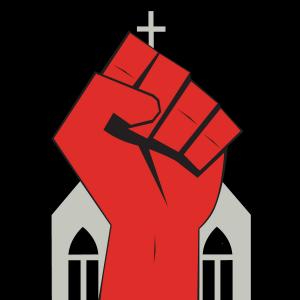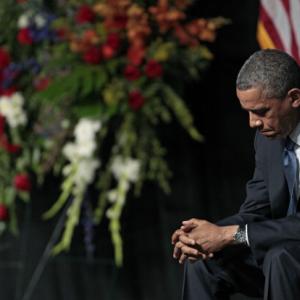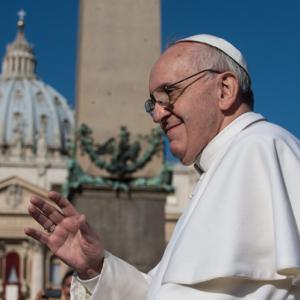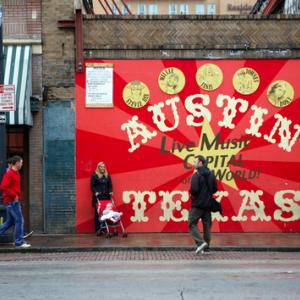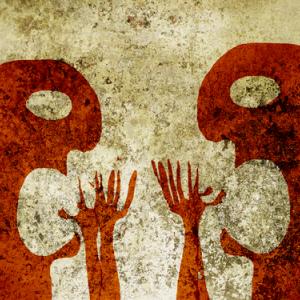Tom Ehrich is a writer, church consultant and Episcopal priest based in New York. He is the author of Just Wondering, Jesus and founder of the Church Wellness Project. His website is www.morningwalkmedia.com. Follow Tom on Twitter @tomehrich. Tom's posts appear via RNS.
Posts By This Author
The Revolution is Upon Us
Religious historians say that every 500 years, Christianity goes through a “massive transition,” as noted religion writer Phyllis Tickle puts it.
Around 500 A.D., “barbarians” sought to subjugate Rome by wiping out its underlying religion. Christianity went underground. In abbeys like Iona, monks painstakingly copied Scripture and civilization’s great writings, in effect saving Western civilization itself.
Around 1000 A.D. came the “Great Schism,” when the Western church based in Rome and the Eastern church based in Constantinople fought over creeds and doctrine, political power and cultural hegemony. That split endures to this day between Eastern Orthodoxy and Catholicism.
Around 1500 A.D. came the Protestant Reformation, when nationalism born of exploration in the New World and new commercial wealth demanded an end to Rome’s domination of European life. That split, too, endures.
Now comes a new millennium, and Christianity wears so many different faces that it’s difficult to speak of a single “Christian movement.”
Creating Connections by Erasing Boundaries
NEW YORK — I sat with my gospel choir colleagues, in a pew, while the host choir at Park Avenue Synagogue rehearsed a lovely Psalm setting in Hebrew.
Some sang the Hebrew text with ease, some with difficulty — a reminder that faith generally means learning a language other than one’s own.
After the synagogue choir sang in their other-language, we joined them to sing in our other-language: swaying to the beat, getting one’s body into the praise. They responded gladly, as our combined choirs rehearsed Richard Smallwood’s epic “Total Praise,” a setting of Psalm 121, which Christians and Jews share.
When two choirs from Park Avenue Christian Church and two choirs from Park Avenue Synagogue, plus some jazz musicians, performed Sunday, at a Psalms festival, we disrupted 2,000 years of animus between Christians and Jews. In the eyes of the creator God who made us all, we said, we are more alike than different, more connected than separated, more eager for shared faith than for separate and superior faith.
President Obama, Mourner in Chief
Five men who know what it means to be president of the United States shared a stage in University Park, Texas. Then the incumbent among them flew to Waco, to mourn 11 first-responders, killed in a fertilizer plant explosion in the small town of West, Texas.
All presidents try to rewrite history to burnish their brief place in it. And in his new presidential library, George W. Bush will have his turn.
Barack Obama’s legacy is still a work in progress, though even sympathetic commentators are seeing him now, in his fifth year, as too slow to act, too cerebral to brawl, and too little respected by his political enemies.
In one role, however, Obama has excelled: “Mourner in Chief” — not one of his constitutional duties but oddly important.
Isolated in America
I wonder if social isolation — not extremist religion or Chechen roots — explains the two brothers who set off bombs during the Boston Marathon, killing three and wounding more than 170.
The older brother, Tamerlan Tsarnaev, was quoted as saying “I don’t have a single American friend, I don’t understand them.” One emerging theory is that, he dealt with isolation in America by seeking his heritage in Chechnya and there, some think, found purpose in violence against his unwelcoming home.
In feeling isolated, the alleged bomber isn’t alone. Isolation is the new normal in America.
How to Respond to a Marathon Massacre
“How do you defend against terrorists?” asked a colleague, as we processed news reports of two bomb explosions near the finish line of the Boston Marathon.
The answer, truth be told, is you probably don’t defend against terrorism. Like a deadbolt on a residential door, you can create deterrents that slow the bad guys down. But a determined thief will only be delayed, not prevented.
Although it isn’t yet known whether these bombs in Boston were a terrorist attack, questions like my colleague’s arise because we live in such an open and “target-rich” society.
Change or Die
Church is being reinvented. So are technology and education. And all for the same reasons.
Facebook just started moving Google’s cheese with its launch of Home. An army of upstarts in Silicon Valley is challenging the hegemony of Microsoft. Nothing is staying the same; disruption is the path to prosperity.
The reason: the marketplace is highly dynamic. New needs emerge. New products stimulate new needs. New entrants want to make a difference right away. Problems and opportunities multiply faster than bureaucratic pillars can respond.
The Real Message of Easter
In Christianity’s passage through Holy Week to Easter Day, a moment of truth will arrive.
Every detail is well known, thoroughly studied, and dramatized by Hollywood and homespun pageants — and the familiar story will reach across the divide and touch, or try to touch, every person who is listening and watching.
Many will get it, especially if they live in circumstances where people get falsely accused by the self-righteous; where the weak and vulnerable get mistreated by the powerful; where physical suffering is a daily occurrence; where death seems like the only next option.
That audience could well comprise the bulk of humanity — those who endure poverty, starvation, and violence of epic proportions, those who live in more prosperous lands and yet are the oppressed, the ignored, the expendable.
For that audience, the Gospel message is profoundly good news.
Honest Questions About the Argentine Pope
Even as a non-Catholic, I was filled with hope when an Argentine cardinal said to be passionate about serving the poor stepped onto the balcony overlooking St. Peter’s Square as Pope Francis.
By taking the name of a church reformer, the former Cardinal Jorge Bergoglio promised a better day for an ossified institution whose people beg for hope while hierarchs defend medieval power and pomp.
By standing in silence and bowing his head for the crowd’s blessing, Francis showed a humility that could inspire believers grown weary of Roman arrogance. In greeting the crowd, the new pope showed a common touch that could repurpose a global movement from being lost in scandal and self-serving.
COMMENTARY: Leaders Who Can Act like Grown Ups
I just spent a wonderful and encouraging weekend with a church leadership team from Reisterstown, Md. I came away filled with hope for this congregation and with admiration for their clergy and lay leaders.
I wish our weak and tiresome political leaders in Washington and state capitals could visit this church in northern Baltimore County and see how mature adults of diverse backgrounds and viewpoints manage to put the congregation first.
They listened, spoke without barbed words and without aggression garbed in niceness.
They voiced their dreams, heard their differences, and then allowed a consensus dream to emerge. They understood the need to move on from yesterday. They were like two healthy parents trying to work a family problem. They seemed to trust each other.
On the Inside Looking Out
CLARKSVILLE, Tenn. — We did a focus group here as part of strategic planning at Trinity Episcopal Church.
Question: if you stood on the edge of your church’s property and looked outward, rather than inward as we usually do, what would you see?
A public school kindergarten teacher spoke about kids who come to school hungry and wearing shabby clothing. She started to discuss the family chaos her kids describe during sharing time, but she began to weep and couldn’t speak at all.
Sorry To Burst Your Bubble
Life inside a bubble can feel complete, even dynamic, as the bubble’s surface shimmers and yet retains form.
When the surface is breached, the bubble collapses immediately, shattering into a liquid spray faster than a metal object can fall through where it used to be. What looked like a permanent structure is, in fact, uncertain and quickly lost.
We saw a ”tech bubble” burst 13 years ago. What had seemed durable and laden with value turned out to be vapor. The “housing bubble” came next. Some think another “tech bubble” is about to burst.
The bubble I see bursting is establishment Christianity in America. It is bursting ever so slowly, even as millions of people still find life, meaning, safety, and structure inside. But one failing congregation at a time, the surface of shimmering shape is being breached.
Gospel Lessons From ‘Downton Abbey’
I got home from a church event on Sunday evening, in time to watch the season three finale of “Downton Abbey” on PBS, but I stuck to my guns about catching up on previous episodes first.
But on Monday morning, The New York Times had two articles about the finale and I couldn’t stop myself from reading them.
So now I know that two key characters get killed off — because the actors playing them wanted to move on from the show. Does that mean watching the older season three episodes is pointless? Not at all. As any Christian can tell you, knowing how the story ends doesn’t take away its meaning or mystery. If anything, you become even more alert to character development.
Killing off characters can work wonders for a television series, but it rarely works for the actors who overestimated what they uniquely brought to the program.
Ask any executive, pastor or educator about moving on and then bombing in the next job: their success wasn’t about them in the first place. It was circumstance, luck or an “alignment of the planets,” if you will, that existed only for an instant.
The Key to Entrepreneurial Success
Some enterprises, like tech start-ups, are all dream and no structure.
A founder’s dream of making a world-changing product compels other pioneers to work long, self-sacrificial days. In what resembles religious fervor, they are like monks in constant prayer, hunched over computers, collaborating at white boards and talking shop deep into the night.
Investors, however, want structure and a return on their investment. So, eventually, do employees, who want stock offerings, benefits, and some sense that the dream has a future.
This awkward transition from dream-only to dream-plus-structure is where many enterprises fall apart. Freedom collides with accountability, jealousy emerges as some get better titles and more stock options and the freedom of “all in this together” gives way to stratification.
Deep in the Heart of Texas Mythology
AUSTIN, Texas — After a walk around the Texas Statehouse, it became clear they tell a different history here.
Inside the Capitol is a large painting of a onetime Tennessee congressman named David Crockett, who failed in a re-election bid and stormed out west to join the revolution in what was then called Tejas. He arrived in 1836 and died four weeks later at the Alamo in San Antonio.
A plaque beneath the oversized painting suggests Crockett was a laborer who became larger than life when he got to Texas. A more balanced account suggests Crockett had been building his legend for many years, with exotic garb, a self-published autobiography, and fiery speeches against President Andrew Jackson. He yearned to star in Washington, and when that failed, he went west, landing at the Alamo just in time to die there.
An ambitious state needs its mythology.
Going Over to The Other Side
“Now I’ve gone completely over to the dark side,” I laughed as I unpacked an Apple iMac desktop computer and set my last Dell Windows PC to the side.
Such is the teasing that goes on among computer users — teasing that occasionally turns to irate bristling and strident claims of supremacy.
But becoming “all Apple” (iPhone, iPad, MacBook, iMac) isn’t the “dark side,” is it? It’s the “other side.” It’s a new product, not a corrupt soul.
Product decisions aren’t expressions of ultimate value. They’re like selling my automobiles and moving to a walking culture in Manhattan, putting aside suits, and starting my own company. It’s the “other side,” not the “dark side” or the “light side.”
I won’t be using my new iMac to steal money from people. That would be “dark side” behavior. I won’t engage in identity theft, patent trolling, luring people into danger, slandering people with whom I disagree, threatening children, starting phony charities. Those would be “dark side” activities.
In recent years, we have seen serious confusion between “other side” and “dark side.” Led by politicians, ideologues and religious zealots, we have been encouraged to view opponents as evil, unpatriotic, a menace worthy of destruction. The opposition wasn’t content to disagree; it also wanted also to dehumanize and demolish.
Emerging From the Wilderness
Wise leaders spend time in the wilderness.
Some choose a sojourn in the desert; most are driven there when their leadership fails.
In the desert, beyond their cocoon of comfort and success, they see more about themselves. If they stay in the desert long enough, they come to understand what they see about themselves. Stay still longer, and some even come to appreciate themselves.
And a few whose desert wanderings go past endurance stop focusing on themselves at all. They discover people and God. Those become the great leaders. They move far beyond self-serving, calculation, manipulation, cleverness, methods, and successful habits. They find common ground with humanity in its brokenness and aspirations, in its resilience and its daily acts of common goodness.
We live in an era of weak and absent leadership.
Conflict Resolution 101
Conflict happens everywhere, from Congress to congregations, from boardrooms to bedrooms. The dysfunction of Congress is just a highly public instance of a typical conflict scenario.
I recently compiled some basics of church conflict. See if you agree with me that this playbook applies broadly.
Church conflicts – which will happen to all clergy and congregations eventually – generally focus on the clergy, just as conflict in any enterprise tends to focus on the top leader. That’s because the underlying issue usually is power – who calls the shots, who can initiate change, who can hold others accountable.
Secondary issues like specific actions, perceived performance and trust get the spotlight, but are surrogates for the power issue. People who want power don’t relish being perceived as wanting power. They prefer being seen as the aggrieved, better performers, more trustworthy, more faithful to ultimate purposes.
Church conflicts usually spring from a small group of antagonists, perhaps even a single person, who start with a conclusion, largely intuitive and emotional, and then search for reasons. Those reasons tend to be moving targets that defy better information. Deal with one reason, and two more take its place.
Antagonists, meanwhile, intimidate others into compliance, or at least silence, by making it clear they will stop at nothing to win.
We Aren’t At Their Mercy As Much As They (or We) Think
NEW YORK — The ancient dream of making money by simply moving money took a hit last week when Citibank announced plans to lay off 11,000 workers.
Across town, the dream of making money by actually making things – a dream that had seemed lost to foreign labor – got a boost when Apple's boss Tim Cook announced plans to make some computers in the U.S.
Citibank's move sent shock waves among people educated to take meetings, crunch numbers, and parlay networking into fees for passing money through their hands. There's no actual creation of wealth; just dipping a large ladle into wealth as it flows past.
Apple's small and somewhat symbolic move, by contrast, stirred hope that manufacturing might return again to American shores and stimulate the manufacturing wages and productive attitudes that once built a middle class.
The $588 Million I (Thankfully) Didn’t Win
I played the New York lottery for the first time last week.
My $2 ticket didn't win the $588 million payout – surprise, surprise – but it did buy me several minutes of musing, most of it instructive, some of it enjoyable.
I quickly ran out of spending ideas – slightly larger apartment, new computer, clothes for my wife, a car to replace the two we sold when moving to Manhattan. I realized I couldn't even spend the income on a lottery bonanza, unless I started buying things I don't need or particularly want.
...
In the end, I liked the idea of financial security, but saw little to be gained from sudden wealth. In fact, given the misery that tends to befall lottery winners, I might have dodged a bullet by not winning.
After this brief fantasy, I wondered more than ever why the wealthy work so hard to avoid taxes and other obligations of citizenship. Even though their effective taxes are lower than they were during the Reagan years and far lower than during the great prosperity of the post-World War II era, the wealthy are lobbying fiercely to pay even less in taxes. Once again, they seem willing to crash the government for everyone, rather than pay their share of its support.
Thanksgiving Everyday
NEW YORK — In the afterglow, I give thanks for Thanksgiving Day.
It might be our most spiritual holiday, dealing as it does with that most spiritual of experiences: feeling gratitude.
Despite the commercial drumbeat for the aptly named "Black Friday," Thanksgiving Day itself tends to be about family, food, and free time. On Facebook, people shared recipes for stuffing, answered questions posed by nervous first-time cooks, told stories about traveling to be with family, and flooded the web with photos of people just being together.
I realize that those are ambiguous realities. Not everyone is blessed with healthy families, not everyone has enough food. Many work hard to prepare food and cheer for others to enjoy. But the promise is there — and unlike the promise of material hyperabundance that has come to dominate Christmas, the promise of Thanksgiving Day seems worth pursuing and attainable.
